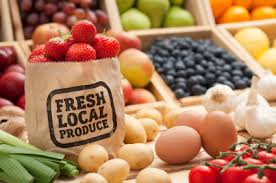
SLOW food stands for food that is:
- Seasonal
- Local
- Organic (or at least pesticide-free)
- Whole
Eating SLOW food helps you to eat as close to the food’s natural source as possible.
When fruits and vegetable are in season they are more likely to be fresh and full of nutrition compared to when they are out of season. A great website that provides you with information on foods to eat each season is the Sydney Markets website. Click here to see what foods are in season for our current Spring months.
The same applies to locally produced food. If food has travelled long distances and has been stored for extended periods of time it is more likely to lose its nutritional value. Also more chemicals may be needed to prolong the shelf life of the food. If you cannot get food from local farmers’ markets, at the very least ensure your food is produced and grown in Australia.
There are many reasons to try to eat organic where possible. One is that we are already exposed to thousands of chemicals in our environment. We don’t want to take in extra through our food. We do not truly know what this concoction does to our body as there is no known way of testing it. Apart from trying to buy organic and pesticide-free food, other ways to reduce your intake of chemicals is to ensure you eat a wide variety of food, wash fruit and veggies well, and trim fat from meat and poultry (chemicals often store in the fat). If you want to know more about how to tell if your food is organic, click here.
As for whole food, this simply means food that is as unrefined and unprocessed as possible, preferably not in a plastic packet, though I know that is difficult to find. I like to think about eating food as though it has come directly from the farm!